
Official Edgar Rice Burroughs Tribute and Weekly Webzine Site Since 1996 ~ Over 15,000 Web Pages in Archive Volume 1767 Presents Edgar Rice Burroughs Reports on the Notorious 1928 Hickman Trial 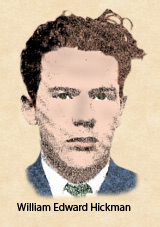
13 Columns for the Los Angeles Examiner |

Official Edgar Rice Burroughs Tribute and Weekly Webzine Site Since 1996 ~ Over 15,000 Web Pages in Archive Volume 1767 Presents Edgar Rice Burroughs Reports on the Notorious 1928 Hickman Trial 
13 Columns for the Los Angeles Examiner |

INTRODUCTION
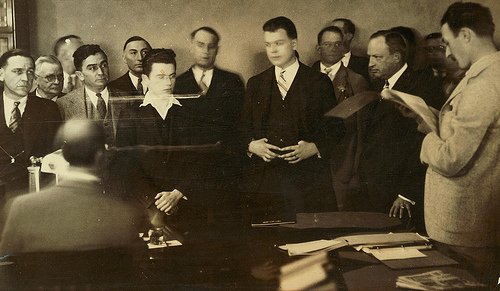
Hickman Court Hearing: William Edward Hickman sans necktie at his court hearing.
Immediately to Hickman’s right is longtime Sheriff Eugene W. Biscailuz and
to his immediate left is his lead defense attorney for the trial Jerome Walsh.For a two-week period in 1928, Burroughs, on temporary assignment as a newspaper columnist covering one of Los Angeles' most sensational trials, bombarded the public with a series of explosive statements and accusations. Certainty that the trial of William Edward Hickman, charged with the kidnap-murder of little Marian Parker and the dismemberment of her body, would arouse nationwide interest led the Los Angeles Examiner to hire Burroughs to attend the sessions and write a syndicated column giving his personal reactions. The column, appearing January 26 to February 10, presented Burroughs in his most irascible and opinionated mood.
Controversial areas he selected for particular vituperation included the question of Hickman's insanity and the alienists who proposed this theory, the court procedures and the laws, the trial atmosphere, and the heredity and the breeding of criminals. Burroughs ridiculed the assertions of defense attorney Walsh and the psychiatrists that Hickman was insane.
On January 26, at the trial opening, Burroughs wrote:
.. . Hickman is not normal. But abnormality does not by any means imply insanity. Hickman is a moral imbecile and moral imbecility is not insanity. The moral imbecile is as well able to differentiate between right and wrong as is any normal man — the difference between the two lies in the fact that the moral imbecile does not care what the results may be to others so long as he may gratify his abnormal egotism or his perverted inclinations.
Ed found the alienists' theories incredible and hilarious; on February 1 he noted, "The idea, as it appeared to me, is to prove that Hickman is not guilty of kidnaping and murder because his mother thought she heard strange noises about the house at night." Hallucinations of this type lead to a diagnosis of insanity. Ed jeered at the entire idea: "When I was a young man I thought, upon a certain occasion, I could thrash a policeman. It was a hallucination. Once I had an hallucination that I could write a play. With these facts well established and a matter of record I may now start upon a career of murder." He comically spoke of "the lives of constant danger that all of us married men lead," and inquired, ". . . how many of us are there who do not sleep nightly in the same room with one who hears things about the house after dark? That is, I mean, of course, if we are sleeping where we should."
He thought the funniest bit of information was furnished by Hickman's high school chum; Ed proceeded to offer his own psychological interpretation of this disclosure about Hickman: "He was a boy orator. That was the first downward step, after that came forgery, robbery, kidnapping, murder. I have known all along that something like this was going to happen if some steps were not taken to stem the tide of boy oratory." He quoted supposed statistics from a newspaper that "the 1928 crop of boy orators will mount to the appalling total of 2,000,000"; the perils of a public confronted by this flood of potentially dangerous orators were beyond the imagination.
Continuing his jibes at the alienists, Ed, on January 27, remarked, "As a criminal physiognomist, I shall have to admit being a total flop. I cannot look at the outside of a man's head and say that he is a murderer, yet, after watching Hickman all day I will venture the assertion that if he is crazy, I am Professor Einstein." He humorously exaggerated the alienists' contradictions of each other's theories and their interpretations of incidents from Hickman's past. Ed conceded that the alienists were sincere, and as a result, could only conclude that what he might otherwise describe as "idiocy or knavery" was due to the fact that "psychiatry is as far from being an exact science as is alchemy or astrology and, as such, it has no place in jurisprudence...." He added, ". . . I believe that it can only tend to befuddle the minds of the jury and becloud the real issue."
While inclined to believe that "whatever insanity" existing in Hickman may have come from his mother's side, Ed maintained that the responsibility for "this monster" rested upon the father: "There are lots worse things in the world than dementia praecox. Moral imbecility is worse, and the father who will not admit the obligations of fatherhood and make sacrifices to the end that his boys and girls be better human beings than he, is a moral imbecile."
Ed's observation of the legal maneuvers of the defense and the tactics of the alienists aroused both his impatience and exasperation."We are the victims of court procedures and of laws that are wrong," he insisted, "and they should be righted by those to whom we look, usually in vain, for such relief." In his impatience Ed resorted to the obvious comments, often made by laymen, who overlook the constitutional rights of the defendant and the necessity to prove his guilt in a court of law. Ed's opinion, stated at the trial opening, was that the procedures might well be abolished; he spoke of "the ponderous machinery of the law . . . the tremendous economic waste . . . represented by the hundreds employed . . . in this hearing who might be profitably employed elsewhere . . . I am moved to wonder if, after all, it is not we who are crazy, and if Hickman and his kind may not be in some respects the only sane people."His point, a typical one, was that the public knew Hickman had committed the crime; why waste time and money in an "unnecessary court procedure"?
At times Ed depicted the trial in a farcical light. He referred to Judge Trabucco as "our new guest conductor," and suggested that a master of ceremonies was needed to introduce the celebrities in the courtroom. Concerning the citizens who were unhappy because they could not "crash the gate," he was sorry to disillusion them: "It is a bum show. The lead is a ham and the comedians are a flop. The heavy is all right. He goes around shouting: `No talking in this courtroom,' and wakes us up every time we lapse into beatific unconsciousness of expert testimony." He believed the alienists provided most of the entertainment, but there were too many of them "in the cast."
From the start Ed emphasized his belief that heredity determined criminal tendencies. His important point was that the hanging of Hickman would be a protective measure for the safety of future generations: ". . . moral imbeciles breed moral imbeciles, criminals breed criminals, murderers breed murderers just as truly as St. Bernards breed St. Bernards and thoroughbreds breed thoroughbreds." He then demanded a general application for his startling theory: ". . . we should not stop with Hickman; in fact, we need not wait to begin with him. The city has plenty of moral imbeciles that we might well dispense with." In his column of January 28 he termed Hickman an "instinctive criminal" and prescribed what must be done about "this new and terrible species of beast": Destruction and sterilization are our only defense and we should invoke them while we are yet numerically in the ascendancy — if we are. . . . And so I should wish to see Hickman destroyed — not through hate, not through malice, but, with all pity, in the interest of posterity.
On February 10, in the final column of the Hickman trial Ed insisted that "our battle must go on" and we must "discourage the uncaught Hickmans from plying their chosen profession and destroy those whom we do catch." He could not refrain from a last gibe at the alienists: "I am out of a job now; but I am thinking of applying for the position of publicist with the American Society of Psychiatrists."
Ed's dogmatic assertions brought annoyed responses from various readers, one man demanding, "Why don't the reporters wait until the trial is over before they bleat as does Burroughs and Adele Rogers St. Johns?"A severely critical comment came from Arthur C. Hannie, University of Illinois psychologist, concerning Ed's reference to Hickman as "a dangerous moral imbecile": From the standpoint of anyone who is at all familiar with normal and abnormal psychiatry, a statement such as: "For moral imbeciles breed moral imbeciles, criminals breed criminals. . . ." is preposterous. Your wild imaginings as displayed in your works of fiction have no place in a case dealing with stern actualities.
The psychologist turned insulting: "We are sorry to inform you that your deductions concerning human `imbecility' show just that in your own personal case." He provided scientific data: "It has been proven that a person of morbific mind can marry and beget offspring of high `moral' integrity. Remember that Jonathan Edwards' grandmother was driven out of the community for gross immorality. This is merely one case out of many that we might quote. Being 'tin homme dans l'oeil publique' you should, as a matter of duty, correct this error."
A reader, on February 1, 1928, irate over the Hickman column, took the occasion to make disparaging remarks about Burroughs:
. . . I have read several of your books and if your imagination at times does not border on a stage of insanity, I'm loco myself. I do not sympathize with Hickman but I think that everyone should have a fair and just trial at least, and your attempt at condemning a plea of insanity looks to me like my mother often said — "the kettle calling the pot black." Question: How could any human commit such a crime as Hickman did and still be sane?Possibly as a further exposition of ideas he had previously expressed concerning the improvement of the race and of government, Ed composed a six-page article (actual date unknown) titled "I See a New Race." The article is visionary and offers a description of an idealistic civilization of the future, stressing a new approach to government and an acceptance of eugenics.
Reference: Porges
THE ERB / CAPTAIN BARLOW CONNECTION
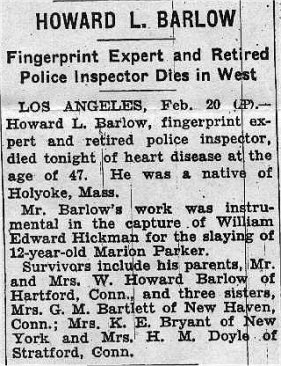
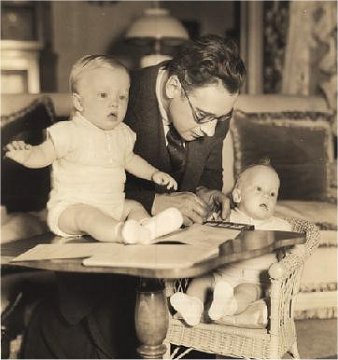

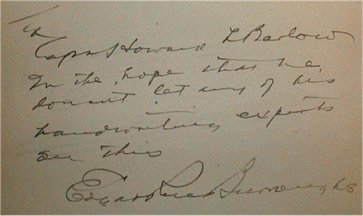
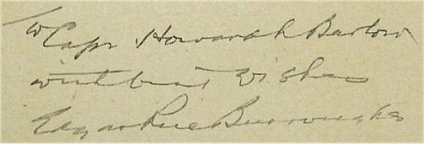
Ref: Adapted from the Court TV Crime Library Site
BACKGROUND TO THE HICKMAN CASEOn December 15, 1927, Marion Parker, the 12-year-old daughter of Perry Parker, a prominent banker in Los Angeles, was abducted from her school. A man had appeared at the principal's office and said that her father had been injured in a terrible accident. Letters demanding money were sent to her father for several days. All the communications, which often taunted the parents, were signed with names such as, "Fate," "Death," and "The Fox." Negotiations with the suspect continued until a price was agreed upon and a meeting was set. Mr. Parker placed the ransom money, $1,500 in cash, in a black bag and drove off to meet "The Fox." At the rendezvous, Mr. Parker handed over the money to a young man who was waiting for him in a parked car. When Mr. Parker paid the ransom, he could see his daughter, Marion, sitting in the passenger seat next to the suspect. As soon as the money was exchanged, the suspect drove off with the victim still in the car. At the end of the street, Marion's corpse was dumped onto the pavement. She was dead. Her legs had been chopped off and her eyes had been wired open to appear as if she was still alive. Her internal organs had been cut out and pieces of her body were later found strewn all over the Los Angeles area.
A massive manhunt for her killer began that involved over 20,000 police officers and American Legion volunteers. Suspicion quickly settled upon a former employee of Mr. Parker named William Edward Hickman who had previously been arrested on a complaint by Mr. Parker regarding stolen and forged checks. Hickman had been convicted and had done prison time. Hickman was arrested a week after the murder in Echo, Oregon. Eventually, Hickman confessed to a dozen armed robberies. Though his attorneys attempted to plead insanity for Hickman, the jury wouldn't buy it. He was convicted of murder and hanged at San Quentin prison in 1928. The Marion Parker case shocked America and inflamed the public's feeling for vengeance against child abductors.
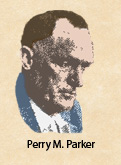
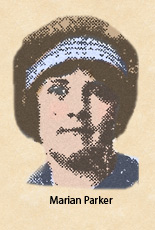

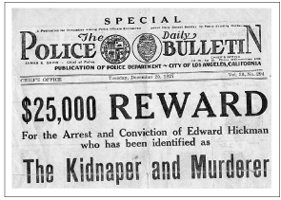 |
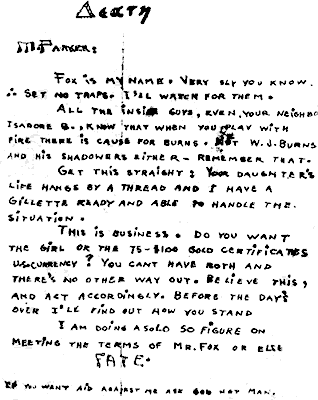 |
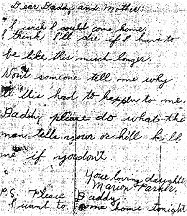 |
ALLEGED CONFESSION GIVEN BY HICKMAN |
ALLEGED CONFESSION GIVEN BY HICKMAN |
KEYES MAKES DENIAL |
DETECTIVES BUSY |
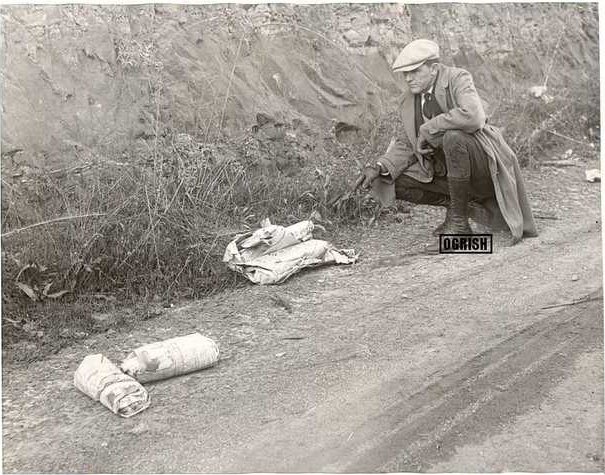
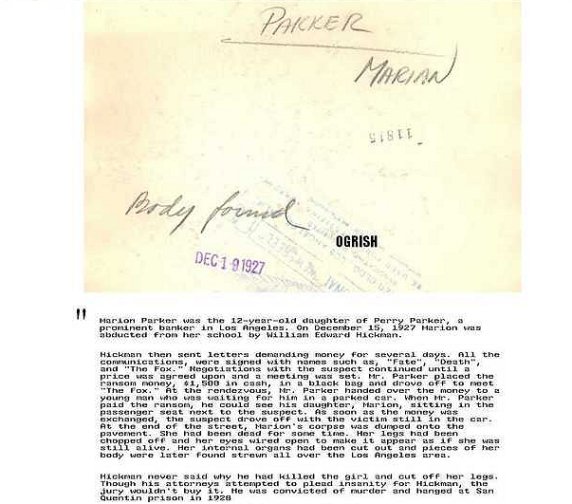
Note: To better understand the articles on the William Edward Hickman trial, a brief recap of the crime will be of benefit to the reader. ~ED.
On December 14, 1927, William Edward Hickman entered a junior high school in Los Angeles and requested taht Marion Parker, a twin and not her sister, be allowed to accompay him to her sick father, Judge Perry Parker. When the school refused, Hickman stated that they should call the Judge for confirmation. Believing that Hickman was telling the truth, they allowed Marion to leave school with him.The next day, Hickman sent the first of three ransom notes, demanding $1,500 in $20 gold certificates in exchange for Marion.
When teh ransom was delivered, Marion was in the automobile driven by Hickman, but her father was not allowed to get too close to the car. Down the block, the girl was pushed out of the car. It was then discovered that she had been murdered and her amrs and legs had been completely severed from the body and were missing as were her internal organs. A towel was stuffed inside her to help keep her sitting up in the car, while her eyes had been sewn open.
Hickman then dubbed the "Fox," was soon captured out of state after spending some of the ransom money. He was returned to Los Angeles where he stood trial.
He confessed to killing Marion, but he pleaded not guilty by reason of insanity, which was a new law in California.
He was convicted of murder in February 1928 and executed by hanging on October 19, 1928.
|
Featured in ERBzine 1768 |
|
1. 'HE'S MORAL IMBECILE,' FAMOUS WRITER SAYS 2. 'I AM EINSTEIN IF HE'S CRAZY', SAYS BURROUGHS 3. BURROUGHS CALLS HIM 'INSTINCTIVE CRIMINAL' 4. 'HE KNOWS RIGHT, BUT BEAST DOESN'T CARE!' 5. IS HICKMAN NOT GUILTY BECAUSE MOTHER HEARD STRANGE NOISES? 6. 'KNEW HE WAS DOING WRONG,' SAYS BURROUGHS 'NAPOLEAN WAS LESS SANE THAN FOX' |
|
Featured in ERBzine 1769 |
|
7. 'CRIME EVEN MAY AFFECT PANEL'S LIVES' 8. MURDER MEANS TO END FOR HIM, SAYS WRITER 9. THRUST AT ALIENISTS MADE BY BURROUGHS 10. SCIENTIFIC DISPUTE LOST ON BURROUGHS 11. HICKMAN'S APPEAL TO JURY DERIDED AS 'SOPHOMORIC ESSAY' TRIAL'S 'BUM SHOW,' SAYS BURROUGHS 12. PARKER'S NERVE STRAIN SENSED BY BURROUGHS 13. 'BATTLE MUST GO ON' VIEW OF BURROUGHS |
![]()
The ERB / 1928 Hickman Trial
Connection
![]()
![]()
![]()
![]()

![]()
BILL
HILLMAN
Visit
our thousands of other sites at:
BILL
AND SUE-ON HILLMAN ECLECTIC STUDIO
ERB
Text, ERB Images and Tarzan® are ©Edgar Rice Burroughs, Inc.-
All Rights Reserved.
All
Original Work ©1996-2010/2019 by Bill Hillman and/or Contributing
Authors/Owners
No
part of this web site may be reproduced without permission from the respective
owners.